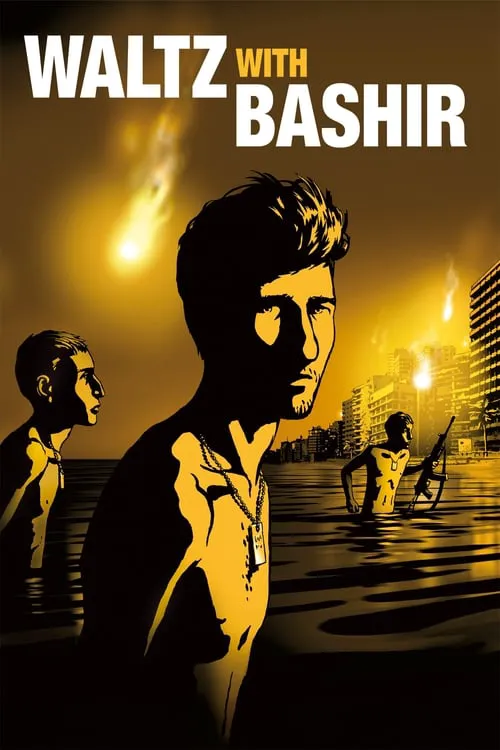Waltz with Bashir

Plot
"Waltz with Bashir" is a thought-provoking documentary film directed by Ari Folman, a renowned Israeli film director and animator. The movie serves as a personal and collective exploration of the 1982 invasion of Lebanon, a pivotal event in recent Middle Eastern history. Folman's narrative takes the form of an experimental memoir, where he delves into the uncharted territories of his own psyche, probing the darkest corners of his memories to unravel the truth about his experiences as a soldier during that fateful campaign. The film commences with Folman, now an acclaimed director, in the midst of a nightmarish dream. As the movie progresses, it becomes clear that his subconscious is struggling to reconcile the fragmented remnants of his memories from the war. These disjointed recollections surface in a series of surreal, dream-like sequences that are both disquieting and poignant. Folman's creative approach to narrating his experiences sets the tone for a deeply personal and emotional journey, which would leave an enduring impact on audiences. In an effort to confront his troubled past, Folman embarks on a quest to interview fellow soldiers who were part of Unit 12th from the Israeli Army, the very same unit he was a part of. These veteran soldiers serve as his guide through the complexities of the war, recounting the horrors they witnessed, the atrocities they committed, and the collective guilt they've carried for almost three decades. Folman's conversations with these soldiers offer a nuanced insight into the brutal realities of war, revealing how the boundaries of human morality were pushed to the limit in the pursuit of military objectives. Through a montage of vibrant animations, Folman skillfully interlards his interviews with the raw, unbridled emotions of his companions. As the veteran soldiers share their stories, their words become the soundtrack for this poignant exploration. Their voices, often laced with a mix of regret and introspection, underscore the devastating consequences of war, exposing the psychological scars that have lingered long after the guns fell silent. The interviews provide a glimpse into the war as seen through the eyes of the Israeli soldiers, highlighting their perceptions, biases, and the dehumanizing experiences that were inherent to the conflict. The film's portrayal of the 1982 invasion, a turning point in Israeli-Lebanese relations, raises questions about the complexities of conflict, national identity, and collective memory. By exploring the intricacies of this pivotal moment in history, "Waltz with Bashir" challenges its viewers to confront the darker aspects of humanity, underscoring the irreparable damage inflicted upon individuals, communities, and nations through war. Folman's creative approach also delves into the realm of his own psyche, tracing the blurred lines between memory and reality. The documentary's use of animation effectively conveys the disjointed nature of his memories, illustrating how his experiences during the war have left indelible marks upon his psyche. The animation serves as a metaphor for the way our memories can be shaped and manipulated, underscoring the complexities of recollection and the fluid nature of truth. One of the most striking aspects of "Waltz with Bashir" lies in its willingness to confront the darker aspects of Israeli military history. By shedding light upon atrocities committed by the Israeli Defense Forces, Folman tackles the sensitive topic of Lebanon, a subject that has long been shrouded in controversy. His introspective approach encourages viewers to engage with the nuances of this complex issue, encouraging a more profound understanding of the war's devastating aftermath. In the end, "Waltz with Bashir" emerges as a cinematic exploration that transcends the realm of a personal memoir. This visceral, thought-provoking film is an ode to the human condition, a reflection on the fragility of memory, and a poignant testimony to the devastating impact of war on individuals and society. By delving into the depths of his own psyche, Folman offers an unflinching portrayal of the 1982 invasion, leaving audiences to ponder the long-lasting implications of war, the indomitability of human resilience, and the complexities of recollection that haunt us long after the conflict has ceased.
Reviews
Recommendations




